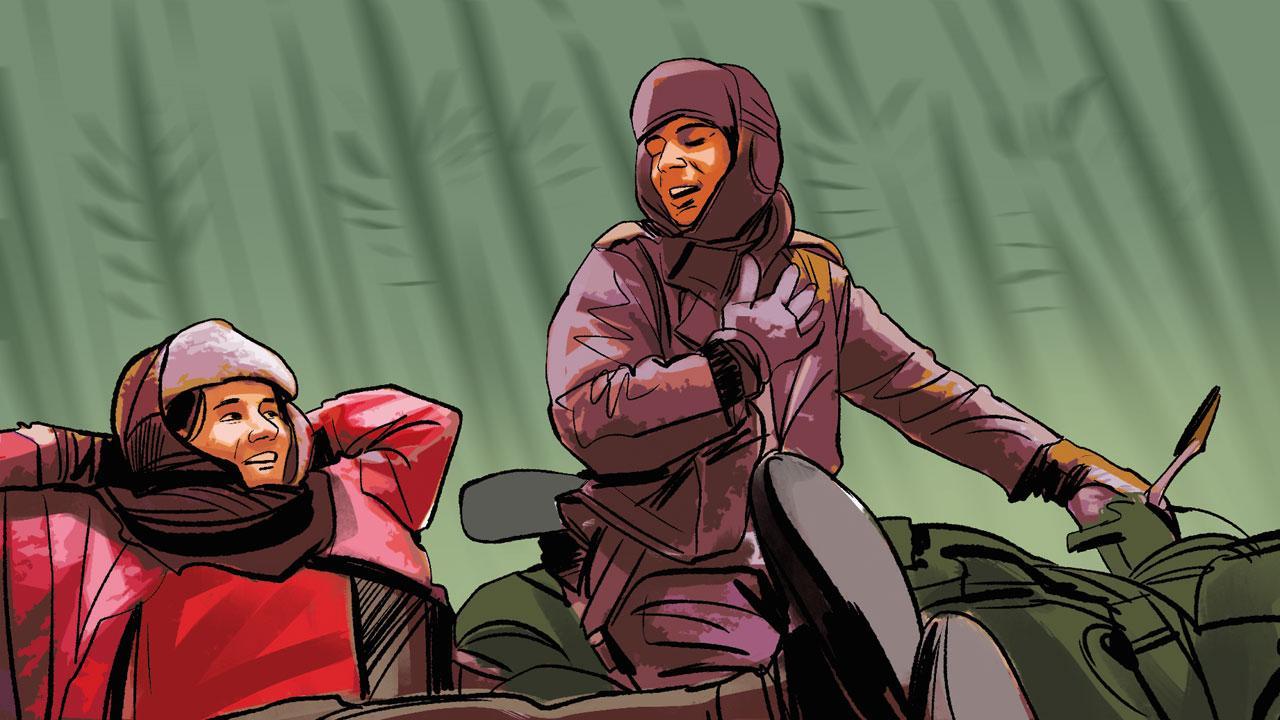It is a compelling coming-of-age film, and sombre reflection on the fall of the Soviet occupation of Afghanistan in 1989 and takeover by the mujahideen, from the viewpoints of teenagers in an Afghan orphanage. Yet, it is also a joyous Afghan tribute to Bollywood and friendship

Illustration/Uday Mohite
It is only cinema’s greats who can move you to both laugh out loud and choke back tears, and still be deeply political, in the same film. Shahrbanoo Sadat’s achingly moving film Parwareshgah (The Orphanage, in Dari, Russian and Hindi, made by the Afghan director), is one of contemporary cinema’s greats. Parwareshgah, that was at the Cannes Film Festival’s Directors’ Fortnight in 2019, and also backed by the Berlin Film Festival’s World Cinema Fund, was shown to Indian/online audiences last week.
ADVERTISEMENT
It is a compelling coming-of-age film, and sombre reflection on the fall of the Soviet occupation of Afghanistan in 1989 and takeover by the mujahideen, from the viewpoints of teenagers in an Afghan orphanage. Yet, it is also a joyous Afghan tribute to Bollywood and friendship, showing how deeply Bollywood is embedded in the daydreams, joys and sorrows of ordinary Afghans, with delightfully used songs from Sholay, Shahenshah, Muqaddar ka Sikandar and more. You appreciate the herculean efforts of a woman filmmaker in Islamic Afghanistan (with her own production company Wolf Pictures), along with German woman producer Katja Adomeit, in making a film that is a Denmark-France-Germany-Luxembourg-Afghanistan co-production, and filmed in Tajikistan, Denmark and Germany. Mind-boggling, yet the film holds resolutely to its core.
Parwareshgah was part of the superb online 17th Asian Women’s Film Festival of the International Association of Women in Radio and Television-India (IAWRT India) from March 5-7, that showed 33 films from 10 nations. The programme included Mina Keshavarz’s The Art of Living in Danger, Ritu Sarin and Tenzing Sonam’s Drapchi Elegy, Shirley Abraham and Amit Madheshiya’s The Hour of Lynching, and more. Samina Mishra is Managing Trustee, IAWRT India, and Deepti Khurana is Festival Director.
The film is Sadat’s second feature, after her debut feature Wolf and Sheep, which won the Art Cinema Award at Cannes’ Directors’ Fortnight in 2016; her short Vice Versa One had played there in 2011 as well. Parwareshgah is also the second in a set of five planned films, based on the diaries of her colleague-cousin Anwar Hashimi. It opens with Qodrat (Qodratollah Qadiri) selling tickets in black for Amitabh Bachchan’s Shahenshah at Cinema Shahr in Afghanistan. Soon, he is arrested for this and dumped in an orphanage. There he learns to make friends and stand up to bullies; the high point being a group visit to the USSR, where boy and girl teenagers mix freely and enjoy games.
Tragedy follows, as the mujahideen soon take over Afghanistan, turning it into an Islamic state, and Sadat poignantly underlines the tribal and cultural savagery that follows. Her direction is boldly powerful when commenting on history and culture, yet delicate when observing adolescent desires and egos. Writer-director Sadat’s screenplay cleverly splices recent political history with a coming of age story. The ensemble cast, mostly local non-actors, notably Qadiri and Sediqa Rasuli, are rough-hewn; their awkwardness all the more endearing. Sadat gets the best of an all-woman key crew, with Polish-born cinematographer Virginie Surdej (superb, intimate) and French editor Alexandra Strauss (packing a lot in 90 minutes, yet unhurried).
The film conveys a lot with marvellous economy: as the mujahideen take over, the childrens’ books are burnt in a bonfire, and worse. In a scene where Qodrat goes to the office to get a file, we see in the background, quietly, that the women staff, who earlier wore Western suits to work, or knee-length Western dresses, are now covered in hijab. Bollywood’s fantasies are a way to cope with life’s relentless horrors. And the magnificent way Sadat uses the “yeh dosti” song from Sholay, that makes you laugh even as you weep, will remain a high point. Thank you, Sadat, for showing us and celebrating how much India and Afghanistan have in common, in contrast with what we are shown, when men are in power. It takes a woman.
Meenakshi Shedde is India and South Asia Delegate to the Berlin International Film Festival, National Award-winning critic, curator to festivals worldwide and journalist. Reach her at [email protected]
 Subscribe today by clicking the link and stay updated with the latest news!" Click here!
Subscribe today by clicking the link and stay updated with the latest news!" Click here!






